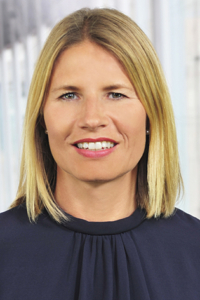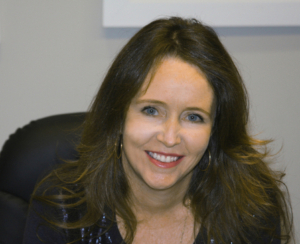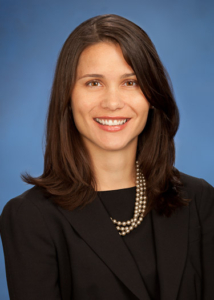 By Cathie Ericson
By Cathie Ericson
Victoria Park believes there’s a real benefit in spending your younger years working with a larger organization where you have ample opportunity to identify your passion, and which allows you to stretch and broaden yourself early on.
She recommends that women surround themselves with a small and diverse group of genuinely supportive mentors and sponsors, formal and informal, male and female. “Rarely is there one role model with whom you identify completely, so ensure you are getting different perspectives to help you find your way.”
An Internal Program Bolsters Her Career
Park relocated to Australia in the late 1990s. “My initial step into financial and professional services recruitment provided the funds for travel en route to Australia and set me onto a different career path completely,” she says. Due to her evident passion for people, she joined PwC in Sydney in an HR role. Over the past 14 years she has built a career in HR at PwC, earned a post-grad diploma in strategic HR and started a family.
She says that in 2006 she found herself at a fork in her career and self-nominated for a development program called the Young Leadership Team, which consisted of five, three-day residential programs.
Park found it to be an incredible experience from the minute she put herself forward; having been with the firm only 18 months and not having the benefit of joining a professional services firm straight out of school, as many do.
When she was selected to participate, she took full advantage of making sure the entire process was beneficial to her learning and career advancement, not the least was just making the decision to put herself out there in a vulnerable way.
Then, she found that the robust feedback she received on her application and the process of interview prep helped her position herself and recognize some of the development points that would be useful for her, including how a breadth of thinking can impact the team. Park says this was one of the most profound experiences in her career.
Along the way she also learned sideways opportunities can be as beneficial, if not more so, in the long term, as you progress into senior leadership roles because diversity of experience is important for long-term success.
Expanding Programs to Support Diversity and Inclusion
Currently she oversees the firm’s Diversity & Inclusion strategy after stepping into the diversity and inclusion program director role 18 months ago, where she found her professional skills, purpose and passion have collided. She had a steep learning curve on some groups she wasn’t as well versed on including LGBT and Australian native groups.
This renewed focus gave the firm the opportunity to reset and look out to 2020 where some recent leadership changes have reinvigorated diversity issues. She notes that there is appetite from the new CEO to see that his legacy around diversity and inclusion is truly embedded in the organization and how they operate with clients and within the firm
“We have done awesome work updating some policies and will have even more success as we overhaul some of the other legacy systems we have in place,” she says, adding that they will be making dramatically different and sustainable changes.
Among the advances they are instituting are a culture change that emphasizes flexibility. The program was introduced two years ago and will be fundamental to their success going forward in attracting diverse workers.
“Organizations that don’t adopt a flexible outlook will miss out on talent,” she says. While there are large opportunities to be flexible in terms of where people work and how they choose to work, she acknowledges it can cause challenges in the short term in changing the standard five-day work week and traditional acceptance of longer hours.
But, by genuinely looking at how teams work, they can offer flexibility for everyone, including supporting males in the role of caregivers. “Flexibility and support for men will allow greater female participation in the work force.”
She finds that work/life balance challenges for women in professional services are impacted by the strong client service ethic, where they assume they need 24/7 accessibility. This has spurred another unintended consequence of limiting the number of senior role models available to show the pathway to younger women coming up.
She herself has been involved in or designed a number of different female leadership programs over the past 10 years.
“The main benefit I and the cohort got from all of them was the opportunity to broaden and deepen the female network,” she notes. She says that they also spent time considering the concept of “swimming against the tide” and acknowledging the feeling most women have encountered where they are in a minority.
Finding Her Own Balance
As technology has evolved over her career, Park has realized the need to consciously consider categories such as hobbies/philanthropy/family/travel as part of how she plans her life. “The distinction between work and home gets increasingly blurred when we consider the traditional working week model we still broadly operate in. By being conscious I strive to ensure that these critical elements of life get the right time and focus to ensure I feel fulfilled.”
As a wife and mother of two boys, ages 9 and 7, she wants to raise them with a positive mental attitude and health, which means being actively involved in their lives and finding time to build a strong connection.
One way to blend the two is to link hobbies to health and family, so they all enjoy running, ocean swimming and sports. She and her husband met working in the wine industry and wine, food and cooking continue to be interests they share.
Over the past few years they have started to share their love of travel, taking the boys on a last-minute trip to Beijing when she was travelling with work, and using the opportunity of trips to the UK to see family and to travel around Europe.
Her philanthropic activity also centers around shared family passions. In 2015 she participated in a fundraising trip to Everest Base Camp to raise money for OzHarvest as her husband is passionate about food wastage at home. “Unfortunately we got caught up in the earthquakes and missed the goal by one day, but luckily we returned safe and unharmed,” she says. More recently she has completed her Bronze Surf Lifesaving qualification and enjoys supporting the local community when on beach patrol.
Through work and outside activities, she wholeheartedly lives this charge: “Have fun, enjoy what you do at least 80% of the time, or change what you are doing.”








